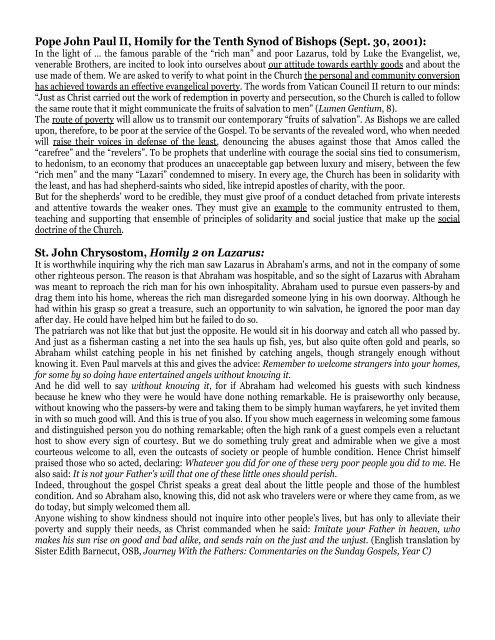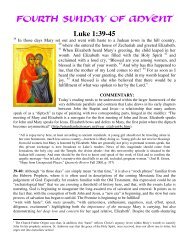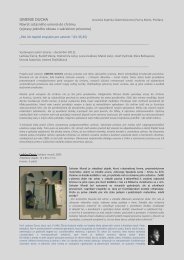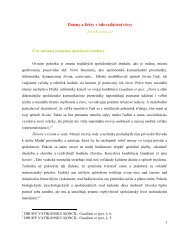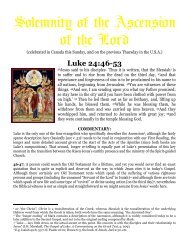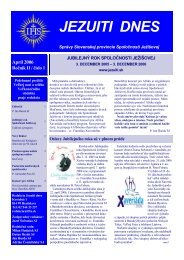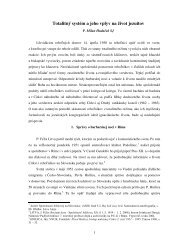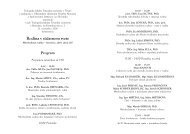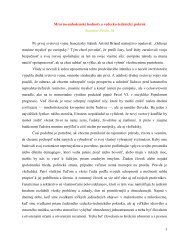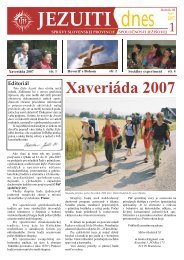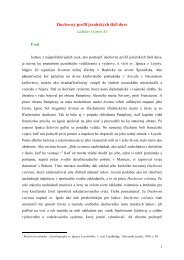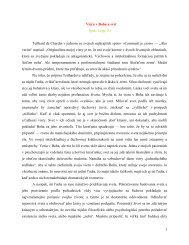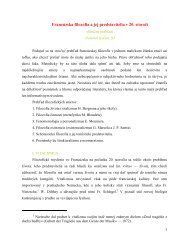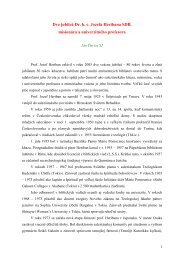Luke 16:19-31 - Jezuiti
Luke 16:19-31 - Jezuiti
Luke 16:19-31 - Jezuiti
Create successful ePaper yourself
Turn your PDF publications into a flip-book with our unique Google optimized e-Paper software.
Pope John Paul II, Homily for the Tenth Synod of Bishops (Sept. 30, 2001):<br />
In the light of … the famous parable of the “rich man” and poor Lazarus, told by <strong>Luke</strong> the Evangelist, we,<br />
venerable Brothers, are incited to look into ourselves about our attitude towards earthly goods and about the<br />
use made of them. We are asked to verify to what point in the Church the personal and community conversion<br />
has achieved towards an effective evangelical poverty. The words from Vatican Council II return to our minds:<br />
“Just as Christ carried out the work of redemption in poverty and persecution, so the Church is called to follow<br />
the same route that it might communicate the fruits of salvation to men” (Lumen Gentium, 8).<br />
The route of poverty will allow us to transmit our contemporary “fruits of salvation”. As Bishops we are called<br />
upon, therefore, to be poor at the service of the Gospel. To be servants of the revealed word, who when needed<br />
will raise their voices in defense of the least, denouncing the abuses against those that Amos called the<br />
“carefree” and the “revelers”. To be prophets that underline with courage the social sins tied to consumerism,<br />
to hedonism, to an economy that produces an unacceptable gap between luxury and misery, between the few<br />
“rich men” and the many “Lazari” condemned to misery. In every age, the Church has been in solidarity with<br />
the least, and has had shepherd-saints who sided, like intrepid apostles of charity, with the poor.<br />
But for the shepherds’ word to be credible, they must give proof of a conduct detached from private interests<br />
and attentive towards the weaker ones. They must give an example to the community entrusted to them,<br />
teaching and supporting that ensemble of principles of solidarity and social justice that make up the social<br />
doctrine of the Church.<br />
St. John Chrysostom, Homily 2 on Lazarus:<br />
It is worthwhile inquiring why the rich man saw Lazarus in Abraham's arms, and not in the company of some<br />
other righteous person. The reason is that Abraham was hospitable, and so the sight of Lazarus with Abraham<br />
was meant to reproach the rich man for his own inhospitality. Abraham used to pursue even passers-by and<br />
drag them into his home, whereas the rich man disregarded someone lying in his own doorway. Although he<br />
had within his grasp so great a treasure, such an opportunity to win salvation, he ignored the poor man day<br />
after day. He could have helped him but he failed to do so.<br />
The patriarch was not like that but just the opposite. He would sit in his doorway and catch all who passed by.<br />
And just as a fisherman casting a net into the sea hauls up fish, yes, but also quite often gold and pearls, so<br />
Abraham whilst catching people in his net finished by catching angels, though strangely enough without<br />
knowing it. Even Paul marvels at this and gives the advice: Remember to welcome strangers into your homes,<br />
for some by so doing have entertained angels without knowing it.<br />
And he did well to say without knowing it, for if Abraham had welcomed his guests with such kindness<br />
because he knew who they were he would have done nothing remarkable. He is praiseworthy only because,<br />
without knowing who the passers-by were and taking them to be simply human wayfarers, he yet invited them<br />
in with so much good will. And this is true of you also. If you show much eagerness in welcoming some famous<br />
and distinguished person you do nothing remarkable; often the high rank of a guest compels even a reluctant<br />
host to show every sign of courtesy. But we do something truly great and admirable when we give a most<br />
courteous welcome to all, even the outcasts of society or people of humble condition. Hence Christ himself<br />
praised those who so acted, declaring: Whatever you did for one of these very poor people you did to me. He<br />
also said: It is not your Father's will that one of these little ones should perish.<br />
Indeed, throughout the gospel Christ speaks a great deal about the little people and those of the humblest<br />
condition. And so Abraham also, knowing this, did not ask who travelers were or where they came from, as we<br />
do today, but simply welcomed them all.<br />
Anyone wishing to show kindness should not inquire into other people's lives, but has only to alleviate their<br />
poverty and supply their needs, as Christ commanded when he said: Imitate your Father in heaven, who<br />
makes his sun rise on good and bad alike, and sends rain on the just and the unjust. (English translation by<br />
Sister Edith Barnecut, OSB, Journey With the Fathers: Commentaries on the Sunday Gospels, Year C)


